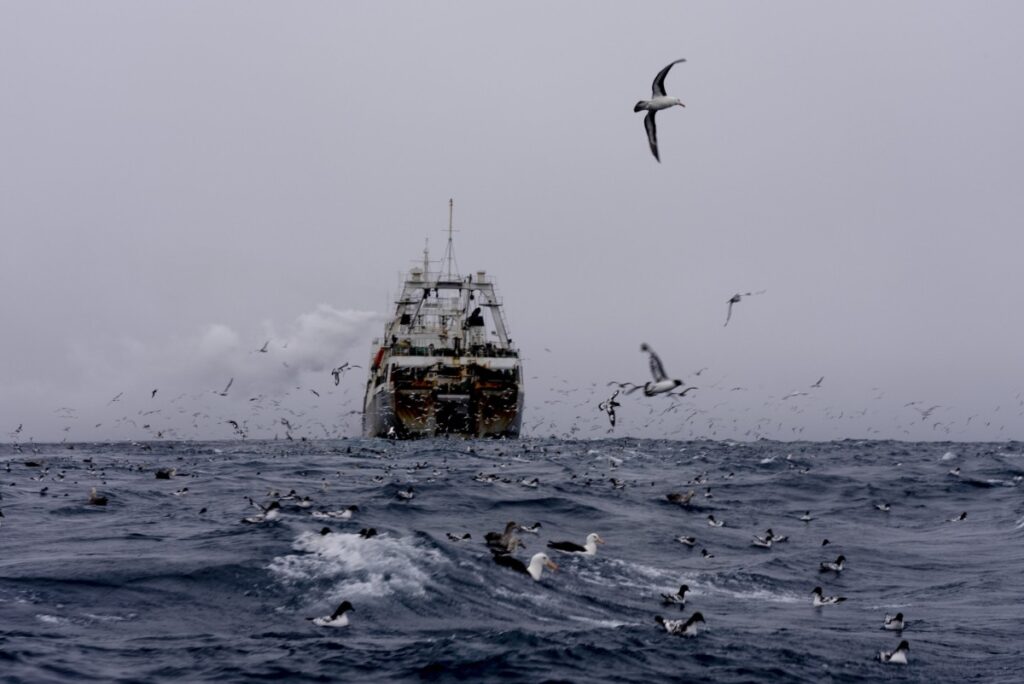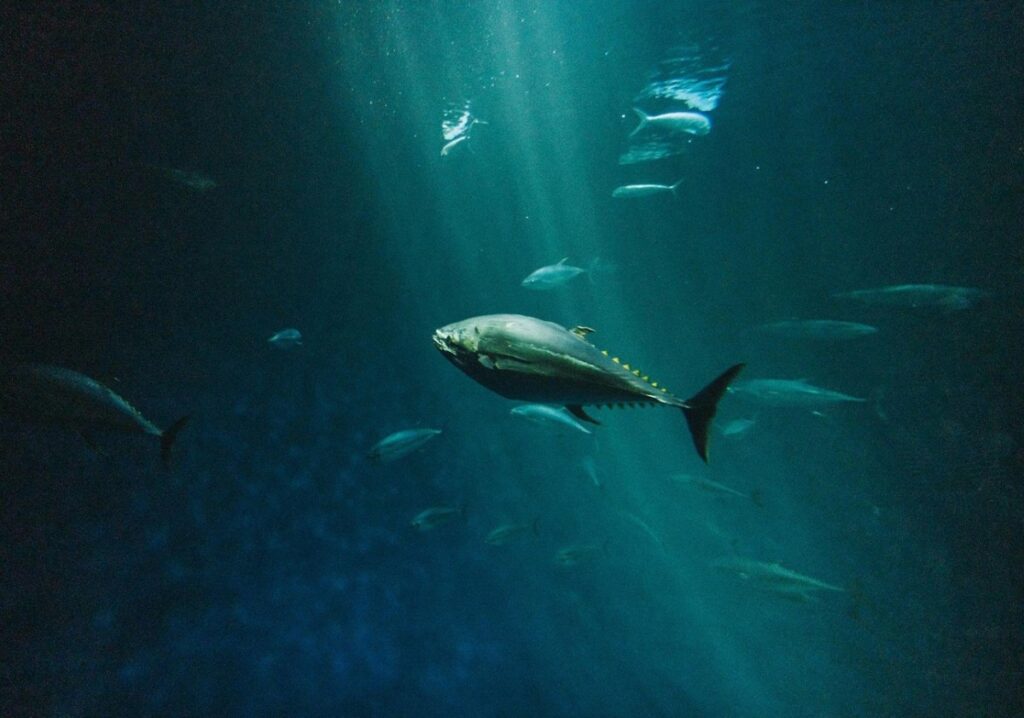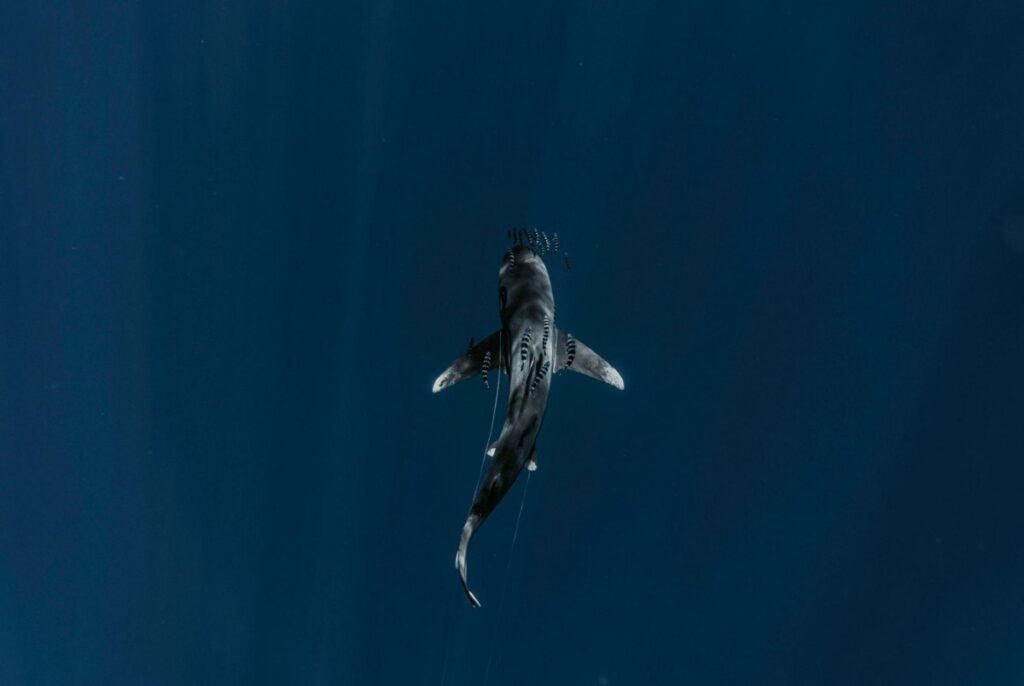Roberts, C. M., Dyer, E., Earle, S. A., Forrest, A., Hawkins, J. P., Hoegh-Guldberg, O., Meeuwig, J. J., Pauly, D., Pimm, S. L., Rockström, J., Sumaila, U. R., & Lynas, M. (2025). Why we should protect the high seas from all extraction, forever. Nature. https://doi.org/10.1038/d41586-025-01665-0

A fishing vessel is followed by flocks of seabirds in the Southern Ocean off the coast of the South Orkney Islands, north of the Antarctic Peninsula, on March 10, 2023. (AP Photo/David Keyton)
Extractive activity in international waters – including fishing, seabed mining, and oil and gas exploitation – should be banned forever, according to top scientists.
The high seas, the vast international waters beyond national jurisdiction, cover 43% of Earth’s surface and two-thirds of its living space. They face escalating threats from overfishing, deep-sea mining, and climate change. Despite their crucial role as biodiversity reservoirs and their importance in carbon and nutrient cycling, less than 1% of these waters are currently protected.
In a new comment paper published in Nature, Why we should protect the high seas from all extraction, forever, marine scientist Professor Callum Roberts and co-authors, including Solving-FCB Co-Director Dr. Rashid Sumaila, argue that all extractive resource use in international waters, such as fishing, seabed mining, and oil and gas exploitation, must either cease or never begin. Continued exploitation risks causing irreversible damage to marine biodiversity, global climate stability, and equitable ocean governance.
The authors call for a global consensus to permanently protect the high seas from commercial extraction, drawing parallels to the successful international cooperation of the 1959 Antarctic Treaty. High-seas fishing, they note, is economically inefficient, environmentally damaging, heavily subsidized, and largely benefits a few wealthy nations. Ending extraction in these waters would enhance fish stocks within national jurisdictions and safeguard critical oceanic functions essential for planetary health. Non-extractive uses, including research and transit, should continue, but extractive practices must be halted permanently.
A permanent ban would also be a decisive step toward achieving the goal of protecting 30% of the world ocean by 2030, as set out in the Global Biodiversity Framework agreed in 2022.

Contributors
The paper includes contributions from some of the world’s most influential scientists and thinkers, including:
- Sylvia Earle, pioneering oceanographer, National Geographic Explorer and Founder and Director of Mission Blue
- Johan Rockström, leading climate scientist and Director of the Potsdam Institute for Climate Impact Research
- Daniel Pauly, leading fisheries scientist and Founder and Director of Sea Around Us at the Institute for the Ocean and Fisheries, University of British Columbia
- Jessica Meeuwig is a global leader in open ocean ecosystems and Wen Family Chair in Conservation, School of Biological Sciences, University of Western Australia Oceans Institute
- Rashid Sumaila, ocean economist and Killam Professor and Canada Research Chair in Interdisciplinary Ocean and Fisheries Economics at the Institute for the Oceans and Fisheries & School of Public Policy and Global Affairs, The University of British Columbia
- Stuart Pimm, global leader in biodiversity science and Doris Duke Professor of Conservation at the Nicholas School of the Environment, Duke University
- Mark Lynas, award-winning science writer and science advisor with the Climate Vulnerable Forum
- Andrew Forrest, mining executive, ocean scientist, philanthropist and advocate of green economic transition, University of Western Australia, Perth, Western Australia, Australia; Fortescue, Perth, Western Australia, Australia; Minderoo Foundation, Perth, Western Australia, Australia
- Ove Hoegh-Guldberg FAA, leading expert in climate change and the ocean and Professor Emeritus at the School of the Environment, University of Queensland

“Life in the high seas is vital to the ocean’s ability to store carbon and is too important to lose,” said lead author Professor Callum Roberts, Professor of Marine Conservation at the University of Exeter and lead researcher with the Convex Seascape Survey. “This paper makes the case that we must stop extractive activities in the high seas permanently, to protect the climate, restore biodiversity and safeguard ocean function for future generations.”
The paper highlights four reasons for a ban:
- Climate stability: The high seas are Earth’s largest and most secure carbon sink. Protecting them is critical to preserving the biological and nutrient cycles that draw down and keep atmospheric CO₂ in check.
- Biodiversity and fisheries: Species such as tuna, sharks, marlin, squid and krill, which are currently targeted in the high seas, would have a chance to recover and spill over into national waters. Fishing in national waters would support food security and fairer access to resources, particularly for lower-income nations in the global South.
- Oil and gas: There is no climate justification to exploit fossil fuels in the high seas, given existing reserves on land and in national waters, and rapid development in green energy generation.
- Deep sea mining: The industry poses uncontrollable and irreversible risks to the environment and climate. Despite claims that the minerals are essential for green technologies, much larger, proven land-based mineral reserves exist.
“The high seas are a critical regulator of Earth’s climate system,” said Professor Johan Rockström, Director of the Potsdam Institute for Climate Impact Research. “Protecting them is essential to preserving global stability and avoiding dangerous tipping points that threaten life on Earth.”
“This is not a fringe environmental demand,” added Mark Lynas, co-author and climate journalist. “Ending exploitation in the high seas is a scientifically grounded, economically sensible and morally urgent decision if we want to avert ecological collapse.”
While the UN High Seas Treaty, announced in June 2023, offers a pathway to greater protection, its implementation will take years. The authors argue that urgent action is needed now. A full ban on extractive use, they suggest, is both feasible and necessary, echoing the successful precedent set for Antarctica in the 1950s.
Convex Seascape Survey
The paper is grounded in the scientific foundations of the Convex Seascape Survey, where Professor Callum Roberts serves as lead scientist. The Convex Seascape Survey is a global research partnership between the University of Exeter, Blue Marine Foundation and Convex Group Limited. It is the most ambitious programme to date focused on understanding how seabed ecosystems contribute to carbon storage and how best to protect them, and today’s Nature paper reflects the Survey’s mission.
The paper, published in the journal Nature, is entitled: “Why we should protect the high seas from all extraction, forever.”
The paper is available here: https://www.nature.com/articles/d41586-025-01665-0.